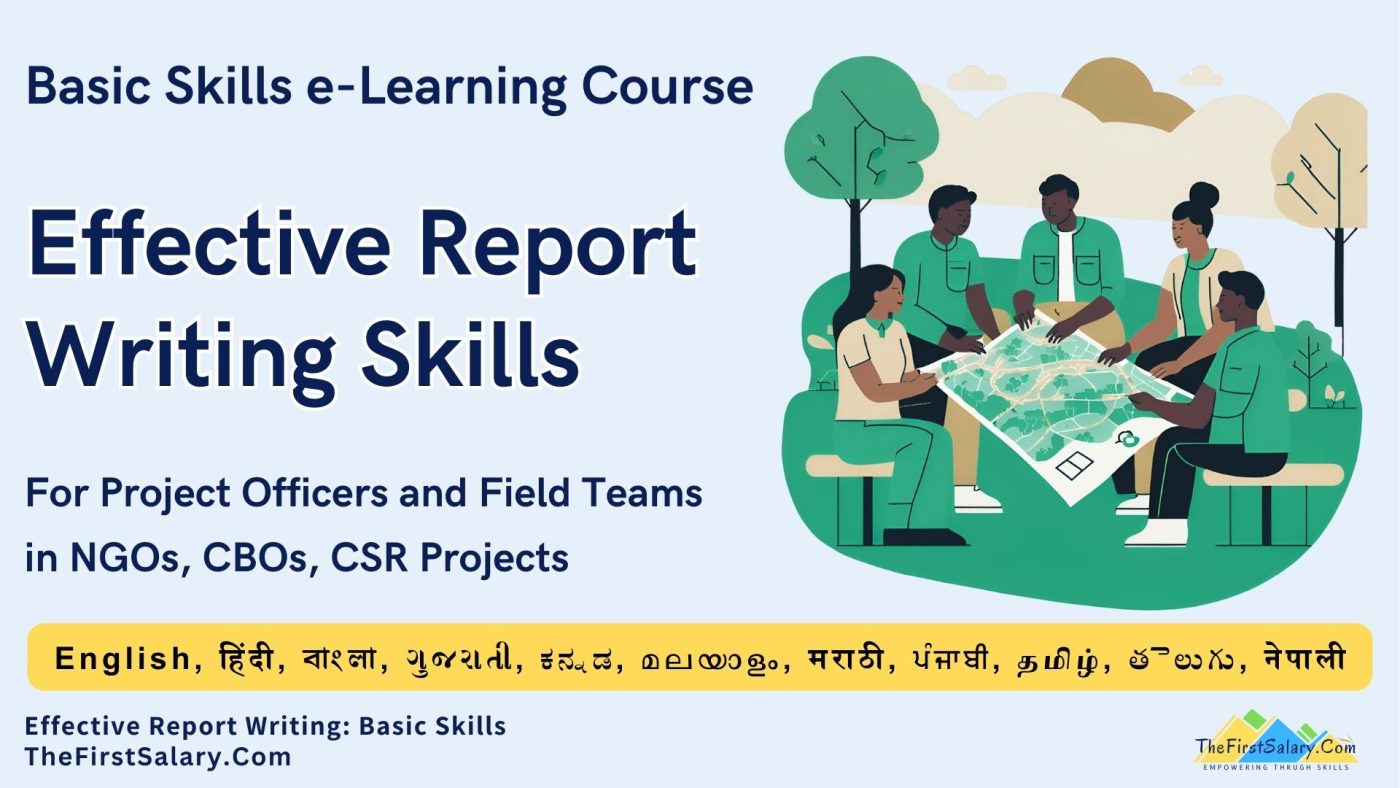Categories
NGO Jobs Skills
0 (0 Ratings)
Effective Report Writing Skills for Project Officers and Field Teams

About Course
Effective Report Writing Skills for Project Officers and Field Teams: Learn how to write clear, accurate, and impactful field reports for NGOs, CSR initiatives, and development projects. This beginner-friendly course is designed for outreach workers, field staff, and project teams working in health, education, and livelihood sectors. Understand the fundamentals of field reporting, plan effective visits, collect real data, write high-quality reports, and review your work with confidence. You'll also gain access to 40 ready-to-use templates, reporting checklists, planners, and field tools—tailored for actual field conditions. With step-by-step lessons, simple language, and relatable examples, this course helps you improve your reporting skills and meet organizational standards. Whether you are new to reporting or want to sharpen your skills, this course will guide you every step of the way.Start today and become confident in writing professional field reports that make a difference.
Enroll now and download your ready-made reporting toolkit!
What I will learn?
- Plan field visits better
- Write clear field reports
- Collect useful field data
- Use reporting checklists
- Avoid common report mistakes
- Write for different people
- Make reports easy to read
- Use photos and tables
- Track your reporting work
- Improve report quality daily
Course Curriculum
Introduction to the e-Learning Course
This introduction lesson will guide you step by step on how to make the most of this course.
Module 1: Foundations of Field Reporting
Learn the basics, purpose, and ethics of reporting to build a strong foundation for your work.
Lesson 4: Ethics and Confidentiality in Reporting
Lesson 5: Simple Reporting Formats/ Templates
Quiz: Module 1 – Foundations of Field Reporting
Module 2: Practical Methods and Tools for Field Reporting
Explore easy tools and field methods like interviews, visuals, and mobile apps to collect information.
Lesson 1: Reporting Methods – Observation, Interviews, and Feedback
Lesson 2: Using Visuals and Documentation in Reports
Lesson 3: Digital Tools for Field Reporting
Lesson 4: Reporting in Emergency or Special Situations
Lesson 5: Simple Reporting Formats/ Templates
Quiz for Module 2: Practical Methods and Tools for Field Reporting
Module 3: Supervising and Strengthening Team Reporting
Understand how to guide your team, review reports, and solve field-level challenges effectively.
Lesson 1: Reviewing and Verifying Field Team Reports
Lesson 2: Managing Timelines and Follow-ups
Lesson 3: Common Errors and Quality Checks
Lesson 4: Field Challenges and Practical Solutions
Lesson 5: Tools for Supervision and Review
Lesson 6: Simple Reporting Formats/ Templates
QUIZ for Module 3: Supervising and Strengthening Team Reporting
Module 4: Reporting for Decision-Making and Stakeholders
Write reports that help managers, donors, and governments make better project decisions.
Lesson 1: Reporting for Donors and Government Stakeholders
Lesson 2: Reporting for Internal Project Management
Lesson 3: Using Reports for Monitoring, Evaluation, and Learning (MEL)
Lesson 4: Simple Reporting Formats/ Templates
Quiz for Module 4: Reporting for Decision-Making and Stakeholders
Module 5: Capacity Building and Best Practices in Field Reporting
Learn how to train teams, write strong case studies, and follow best practices in reporting.
Lesson 1: Building Reporting Capacity in Field Teams
Lesson 2: Writing and Presenting Case Studies
Lesson 3: Best Practices in Field Reporting
Lesson 4: Simple Reporting Formats/ Templates
Quiz – Module 5: Capacity Building and Best Practices in Field Reporting
Course Recap and Resources
Common Mistakes and How to Prevent Them
Glossary of Key Terms
Course Recap and Resources
Earn a certificate of completion.
Earn this certificate of completion after enhancing your basic skills & increased knowledge base.

Student Ratings & Reviews

No Review Yet
Who should take this course?
This course is for anyone working in the field for NGOs, CSR projects, or social development programs—especially Project Officers, Field Officers, Field Staff, or Project Team members.
Is this course only for experienced project officers?
No. This course is helpful for both beginners and experienced staff. It explains everything step-by-step using simple examples and templates.
I'm an education field worker. Is this course useful for me?
Yes. This course is designed for field workers in all sectors like health, education, livelihood, women empowerment, rural development and more. The tools and templates are useful for every type of reporting.
Can community mobilizers and data collectors also join this course?
Absolutely. If your job includes planning field visits, collecting data, or writing reports, this course will help you do it better and faster.
I'm not from a social work background. Can I still learn from this course?
Yes. You don’t need any special degree. The course uses simple words, short lessons, and real examples that anyone can understand.
Material Includes
- 1. Online Study Materials: Engaging and informative lessons covering key aspects of non-verbal communication.
- 2. Interactive Quizzes: Short quizzes after most of the module to test your understanding and reinforce learning.
- 3. Case Studies: Real examples to illustrate the application of non-verbal communication skills.
- 4. Certification: A certificate of completion upon successfully finishing the course.
₹100.00
₹500.00
(GST inclusive)*
- LevelIntermediate
- Duration24 hours
- Enrollment validityEnrollment validity: 180 days
- CertificateCertificate of completion
Hi, Welcome back!
A course by

Sanjeev Kumar
Director- General Academy for Basic Brilliance and Upskilling

TheFirstSalary.Com
General Academy for Basic Brilliance and Upskilling

Sunita Kumar
CEO- General Academy for Basic Brilliance and Upskilling
Requirements
- 1. Age: 21 years and above
- 2. Education: Graduation with any stream
- 3. Time Commitment: To complete the 5-module course, you may need about 3 to 4 weeks, investing 6 to 8 hours per week, with each module taking approximately 3 hours.
- 4. Work Experience in Social Causes: Prior experience working on social projects or initiatives. Awareness of social problems and a desire to create positive social change.
- 5. Device and Internet: Use a computer or mobile device with reliable internet. Know how to use online platforms and submit assignments.
- 6. Basic Computer Literacy: Ability to navigate online platforms, access online materials, and submit assignments online.
- 7. Language Proficiency: Basic understanding of English to comprehend course content and participate in activities. Translations in regional languages may be available, but accuracy is not guaranteed.
- 8. Problem-Solving Skills: Aptitude for identifying and resolving issues in a project setting.
- 9. Motivation to Learn: A strong desire to improve your skills in project management.
- 10. Active Participation: Engage with course materials, complete exercises, and participate in discussions. Prepare to take notes and reflect on key concepts and strategies.
- 11. Professional Attitude: Approach the course with a focus on personal growth and professional development.
- 12. Open Mindset: Willingness to learn and apply new strategies for handling workplace challenges.
Target Audience
- NGO field team members
- CSR project staff
- Community outreach workers
- Social work trainees
- Junior project officers
- Development sector beginners
- Livelihood project workers
- Field survey team leaders
- NGO reporting assistants
- Skill-building trainers and mentors
Tags
Community Development Projects
Community Empowerment Workshop
Community Mobilization Training
CSR and Development Project Reporting Course
Field Reporting Skills for NGOs
How to Write Field Reports for Social Work
NGO Field Staff Training Course
NGO Project Officer
outreach
Outreach Worker Skills
Project Officer
Report Writing for Outreach Workers
